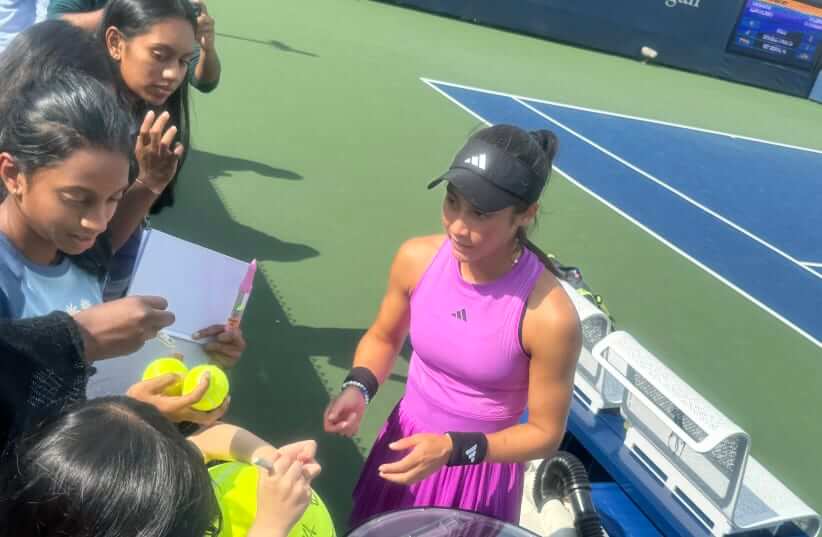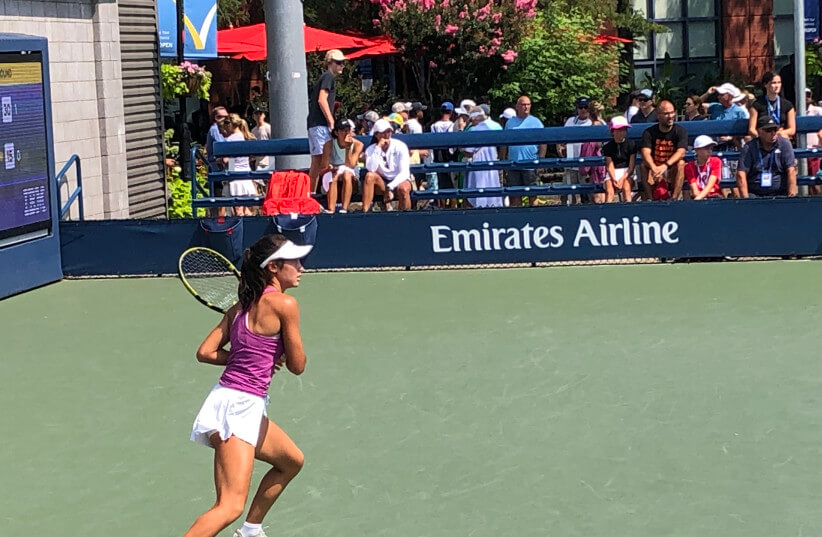Despite a tough quarterfinal exit, Kaylan Bigun’s tennis journey is marked by family support, connections to Israel, and excitement for his upcoming college career at UCLA.
View the original article on The Jerusalem Post

For 18-year-old tennis player Kaylan Bigun, the US Open was one to remember. Even before the French Open juniors champion and former world No. 1 junior kicked off a quarterfinal run in the US Open junior boys’ tournament – where he was the second seed – he had already spent nearly three weeks on the grounds of the USTA Billie Jean King National Tennis Center.
Bigun had seen action in both the US Open men’s qualifying tournament and the mixed doubles tournament. The Los Angeles native was one of nine men to receive a wild card in the men’s qualifying tournament, where he lost in the first round to Valentin Vacherot of Monaco 7-6, 6-4. He also received a wild card into the mixed doubles main draw with fellow teen standout, 16-year-old Iva Jovic. They won their first-round match against Dayana Yastremska and Max Purcell, 6-4, 6-4, but lost in the second round 6-2, 6-3 to fourth seeds Barbora Krejcikova and Matthew Ebden.
Bigun began his bid to win the boys’ juniors championship with a 6-4, 6-2 win in just over an hour against Andreas Timini of Cyprus. He advanced with a similarly straightforward second-round hour-and-seven-minute straight-sets win against Karim Bennani of Morocco, 6-2, 6-2. In the round of 16, Kaylan beat fellow American Matthew Forbes 6-2, 6-4. However, the quarterfinals presented a super-tough opponent in Spain’s Rafael Jodar – a far cry from another Spanish Rafael, but still a stiff challenge.
Jodar took the first set 6-4, but Bigun rallied for a 7-6 second-set win to equalize. However, the Spaniard prevailed 7-5 in the decider to spell the end for Bigun’s title hopes after a valiant effort.
In the days between the men’s qualifiers and the start of the juniors’ tournament, Bigun practiced with his Princeton-bound tennis-playing twin brother, Meecah, and his father, Dmitry. Bigun would undoubtedly have some great stories to share with his college classmates when he began his studies and college tennis career at UCLA in January. Kaylan and Meecah spoke with The Jerusalem Post in the junior player’s dining room after a practice session; their father spoke with the Post separately outside of Stadium Court 17 at the US Open. The brothers spoke openly about their incredible tennis journeys, which included a healthy dose of Jewish and Israeli experiences.

Bigun enjoyed his first experience playing at the US Open in the men’s qualifying tournament.
“Playing your first pro US Open, I guess I was a little nervous, and those emotions can be stressful before matches, but I tried to stay focused on what I could control and how I wanted to play.”
Waiting for many hours for his match to start was also a challenge; it was the fifth match of five.
“Obviously it wasn’t easy waiting all day for the match, but when I came out there it was cool. Some of my cousins and other family members came, so it was really nice to play in front of them and see how proud they were. Also, the crowd was pretty good, so that was fun.”
Given Bigun’s success in the juniors over the past year, where he rose to the No. 1 ranking after winning at Roland Garros – in addition to appearing at each of the junior Grand Slam events and making it to the semifinals of the prestigious Orange Bowl International Championship – he had grown accustomed to winning. However, playing against professional players was a new and different experience.
“Obviously, losing was not the fun part. I felt I could have played better in some parts, but overall it definitely was a good experience. I was where I wanted to be and was kind of taking every point and trying to keep going forward and really just enjoying the moment, smiling out there.”
After exiting the qualifying tournament, Kaylan and Meecah spent a lot of time practicing on court together. Both brothers have aspirations of becoming professional tennis players. Meecah felt it may take him a bit longer, given the academic rigor he anticipated at Princeton. Meecah didn’t participate in the US Open tournament, though he stayed with his brother “trying to help out in any way possible” until he left for college orientation the day after the interview.
The brothers, who bantered and finished each other’s sentences during the interview, appeared to enjoy each other’s company a great deal. The twins grew up together, both at home and on the road, at tournaments and tennis academies, while fishing together, homeschooling with their teacher mother, and with the Seton Home Study School.
While their university classes would essentially be their first formal group-learning experience since third grade, they were quick to point out that their social skills did not suffer as a result of homeschooling and online learning, noting that playing tennis in an academy and competing in tournaments meant constantly being around other children.
Kaylan felt their years on the road balancing sports and academics would serve them well in college and in life.
“Players are used to the hustle and bustle of traveling.”
On court, the brothers helped each other improve.
“We compete against each other, but we also help each other out on the court,” noted Meecah.
Kaylan appreciated Meecah’s contributions.
“He is obviously a very vital part of my tennis… mentally and just in general. I love having him around. It’s like your best friend with you wherever you are.”
Their father, Dmitry, a pharmacist by training who immigrated to Los Angeles from Ukraine 35 years ago, brought them to the courts—in a stroller—from the age of one. He also introduced them to a range of sports, including swimming, basketball, and soccer. They also spent a lot of time on the playground.
A tennis player himself, Dmitry enlisted friends to hit balls with his boys, and Dmitry hit balls with their children in return.
“Our dad played tennis, and he introduced us at a really young age,” Kaylan recounted. “I have been playing and holding a racket for as long as I can remember; it has been a part of my life for as long as I have lived.
“At first, it started off with just the three of us having fun on the court, then we played a few tournaments. Next thing you know, we got a little more serious. And a little more serious. I think what’s important is that when the three of us are on the court, we still have the same fun that started it all.”
Dmitry recalled the boys starting to get serious about tennis at age 10. “We met a coach from JTCC (Junior Tennis Champions Center in College Park, Maryland). The coach said, ‘I like your kids’ and invited them to train there.” Dmitry reported that he became a “full-time tennis parent,” and the family relocated to College Park, Maryland, from Los Angeles, California, where the boys trained for four years until the COVID-19 pandemic.
“We really hit it off with Asaf Yamin [the Israeli former director of high performance and current director of international operations at JTCC]. He has a good knowledge of tennis, he is a good person to go to with questions, the guys loved him, and he is a good family guy.”
Kaylan added: “My brother, my parents, and I would go to Asaf’s house for some Jewish holidays and Shabbat. It would always be fun. And we would stay at his house when he ran the tournament at College Park – so it was always a lot of fun. It felt nice that we were connected to the Jewish and Israeli community outside of LA in DC, so that was a good feeling. It was awesome.”
Yamin was pleased with the growth and progress he had seen with the Bigun boys and knew how excited they both were about the possibility of eventually playing on the pro tour.
Yamin described Kaylan as “very aggressive but also creative” and as someone who liked to be “a big stage player” who “shined at big events. He is very easy, fun, curious, serious, and a really good boy with a good heart.”
While the boys had played doubles together before, they both aspired to “make it” as professional singles players. They playfully dismissed the suggestion that they might one day follow in the footsteps of the very accomplished tennis-playing Bryan Brothers twins.
“We like playing doubles. I feel like both of us are pretty good, but we haven’t really gotten into playing doubles with each other too much yet, but maybe that’s something in the future we will do.”
The twins had several opportunities to travel to Israel in the past and proudly recounted what they described as a “full-circle moment” on one of their family trips to Israel.
At the Israel Tennis Education Centers in Ramat Hasharon, they had the chance to meet and train with Dmitri Romanovitch, the coach who taught their dad the game decades earlier in Kiev.
“It was fun,” exclaimed Kaylan. “We got to play with some of the kids our age and some of the older guys. The guy who coached my dad would run these fun sessions. He was so energetic. We would have a bunch of games and drills back to back. It was intense, but we had a lot of fun at the same time.”
They also traveled throughout the country.
“We really got to see a good amount of the country, which was awesome,” said Meecah. “We went to the Dead Sea and Jerusalem, and we have family in Haifa and in Tel Aviv as well.”
“The food is obviously unbelievable,” added Kaylan. “The people are hospitable. Honestly, it is like one big family over there. Everywhere we went, we felt welcomed. It was definitely a good family feeling. My favorite was pomegranate juice you get on the street. Obviously, the hummus there is next level. The beaches are nice. There is so much to do there. I loved every part of it.”
While the boys hoped to get back to Israel, they had to turn their full attention to their tennis and university studies.
“I am super stoked about heading to UCLA,” said Kaylan. “It is pretty close to where we live. And I have a lot of friends who go there. I am really excited. The coaches are great and the people, so I can’t wait.”

